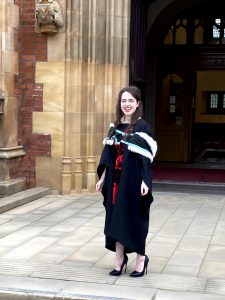This post is part of our Research Initiation Scheme for 2022-2023.

What has your academic trajectory been so far?
I really enjoyed languages at school. I studied Spanish at GCSE and took French just before GCSE, and I decided to continue them. I did an undergraduate degree in French and Spanish, and decided that I hadn’t had enough of French. I really wanted to keep going so I decided to continue on to MRes because I wanted to work in a research-led, more heavily dissertation-weighted kind of course, and I didn’t think the taught programs, like the MAs, were as good a fit. I did an MRes on medical humanities and French culture, even though I had never studied medical humanities before. The MRes is a good space to discover something completely new. I really wanted to keep this going, so I decided to apply for a PhD (which you absolutely do not have to do if you get an MRes!). The MRes sets you up well for it; you get the chance to explore other areas of the School and get a chance to experiment with some more independent work.
What are you currently working on, and why did you choose the topic?
I’m still within the medical humanities, I really enjoy it. While I was doing my MRes, I got really interested in broader networks of people. So, for example, I was looking at one person suffering with alcoholism, but I became interested in what the experience for other people around them might be like and what their lived experience of care is like. I decided to put together a PhD project with my supervisor on narratives of family alcoholism. I’m looking at people who have grown up with an alcoholic mum or dad and how they write about their lived experience and have come to understand health care and their parent’s experience. For me, it really grew out of my MRes project. I will say that that the project did change post-proposal, so there’s nothing wrong with you or the project if it has to change. The research evolves and grows with you.
What have you found most interesting about your research so far?
What really fascinated me is how much you can learn from other people and how widely you can collaborate across spaces that you maybe didn’t consider. For example, I went to a postgraduate student day where people come together to share their research and I got talking to a historian who works on the Holocaust in French and German. We found some interesting counterpoints and parallels. We spoke about the voices of young people and children in research. I think it’s fantastic that while working on the PhD, although you do spend time working on your own or with a smaller circle of people, there is potential to see ripple effects.
What does the average day for a PhD student look like?
That’s a really interesting question, and it’s so different for everybody, so you’ll get a lot of advice like, ‘go and work in your office from 9 to 5’. That hasn’t always necessarily worked brilliantly for me, but I think that’s the joy of it. You get to find your own rhythms and what works best for you. I look at work in deadlines of about two to three weeks, so usually every two weeks I have a goal I’m working towards. I’ll break that down into smaller steps. It is worth it to take the time to stay active, both at Queen’s and in your social life, as it can be quite a lonely process sometimes. Every day is different, but you make what you want of it, and that’s a joy and a privilege not everyone gets in their workspace.
What advice would you give to final year undergraduates who are thinking about pursuing research?
I would say that because you’re so enthusiastic, there’s a real temptation to jump straight in and do everything at once, but if you do that you’re going to be burned out by November. So take some time just to have a break. Celebrate the accomplishment that you’ve finished your degree and all the years of schooling that led to it. Also, take the time to read widely. Read things that interest you even if you think it’ll be a dead end because that’s part of research. I would also say to keep connected with others in the department. Everyone is happy to elaborate and help you. If you need support, reach out early to get it because people are very, very willing to give it. Be proud of yourself. You deserve to be there, don’t let anyone convince you otherwise.
Interview by Emily Monroe, final-year undergraduate in French